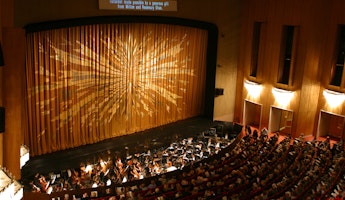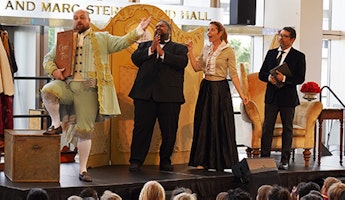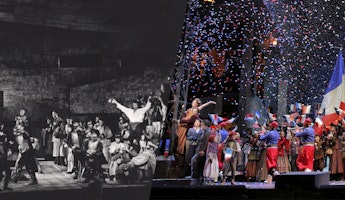Blog
November 9, 2022
Behind the Magic of “Omar”: Costumes
Omar is full of symbolism and hidden historical details placed specifically in the costuming. In fact, no two costumes are the same. The use of colors, drawings and even printed words on the costumes are used to help understand Omar's story and also provoke the audience to take a deeper look.
LA Opera Wardrobe Dresser Danyele Thomas shares that while unloading the costumes when they came in, she and her co-workers were blown away by the beauty, the colors, the fabrics, and especially the messages that were on each individual costume. She highlighted some of the details in a few of the costumes during her Instagram takeover. In case you missed it, we have you covered. Let's take a look!
The asterisk is a symbol of how white women often signed documents, since at that time some did not know how to write.
The costume for the dancer soloist called “The Figure” has strands of fabric from head to toe that matches the fabric of each one of the actors on stage. He represents the collected spirits of the ancestors in the Spirit World.
In the top of the second act, the historical Omar’s actual handwriting has been printed on leading tenor Jamez McCorkle's costume
Omar’s costuming is symbolic and indicative of his present circumstances in each scene mainly through colors. In the beginning and up until the point to slavery he wears a costume that is a mixture of Islamic and African cultures with bright bold colors.
Abdul, Omar’s brother in the opera, also has a vibrant costume with Arabic writing on it that captures the vibrancy of the West African culture.
On the se particular costumes, there are drawings of what looks like someone drowning and it symbolizes the enslaved Africans who were lost at sea or killed during the journey at sea.
Omar wears earthy brown color when he becomes enslaved, which is a strong contrast between the previous scene with his vibrant colors while free in Africa.
Omar then has a bright baby blue and white costume when he is enslaved to the Owen family who converts him into Christianity (or at least tries to). His costume matches the colors of the Owen family's costumes, signifying that he belongs to them.








/03-cosi/_dsc0996_pr.jpg?format=auto&fit=crop&w=345&h=200&auto=format)
























